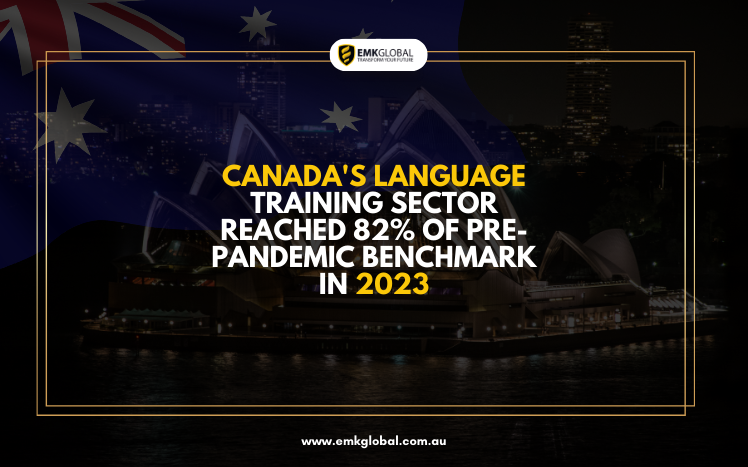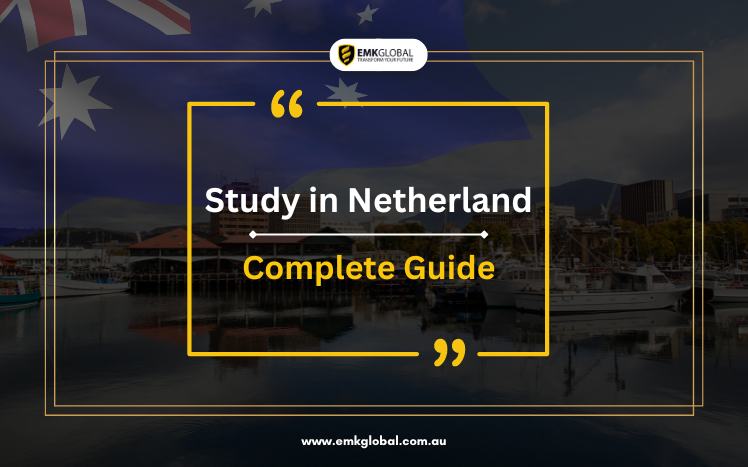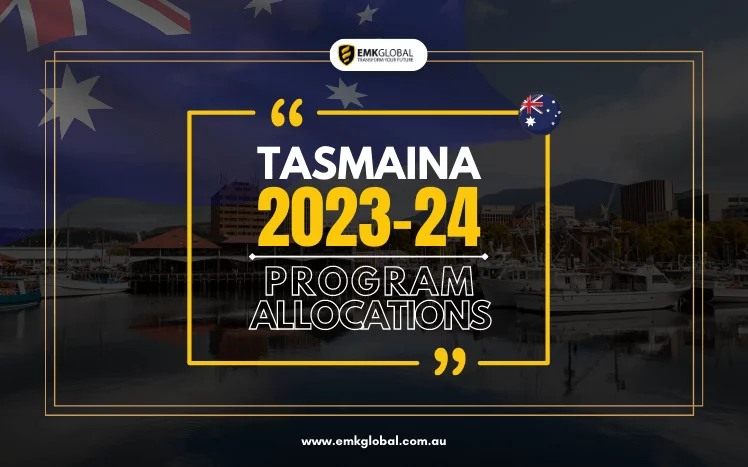In 2023, the language training industry in Canada carried on recovering from the pandemic. According to a recent annual report from Languages Canada, which was created by industry research experts BONARD, enrollment in Canadian language courses, including English and French, was 112,564 last year, with 1,234,447 student weeks of instruction given.
That volume for 2023 is equivalent to 82% of pre-COVID student weeks and 75% of pre-pandemic student populations. Approximately 92% of those student weeks were devoted to learning the English language, with the remaining 4% being devoted to learning French. Of that total, just over 80% (83%) were provided by private providers, with state institutions running language programmes for the remaining 17%.

Students enrolled in English- and French-language training programmes in Canada, 2019–2023 (left); Student weeks delivered by English and French language training providers in Canada, 2019–2023 (right). Source: BONARD/Languages Canada
In 2023, in-person education accounted for about two thirds (63%) of all student weeks, with 30% of instruction being provided online (for both domestic and international students). The last six percentile of student weeks were delivered using a mixed methodology.
The bulk of students were enrolled in academic preparatory courses, pathway programmes, or general language study, as can be seen in the overview below.
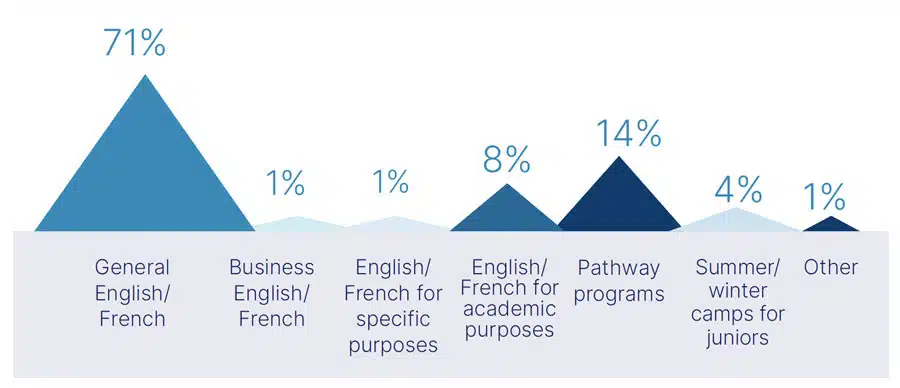
Enrolments in language studies in Canada, by course type, for 2023. Source: BONARD/Languages Canada
Where do students come from?
In Canada, more than three out of every four language learners (76%) are from Asia or Latin America. Highlighting the top 10 sending markets for 2023 is the infographic that follows. In 2023, all of those top sending nations saw growth over the previous year, with the exception of Colombia, which saw a -6% fall.
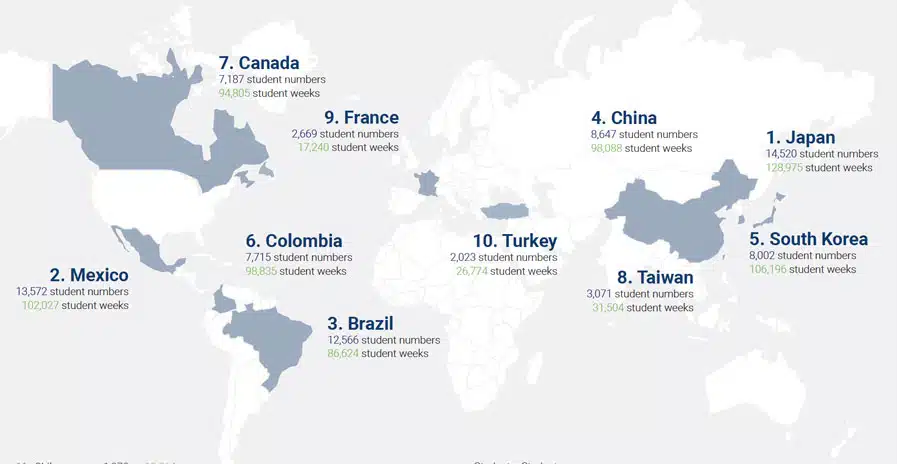
Top ten sending markets for Canadian language-learning programmes, 2023. Source: BONARD/Languages Canada
Visa status and visa challenges
Numerous students who had a guest visa (designated as “eTA” or electronic travel authorization in the legend below) attended a Canadian language programme, according to the accompanying chart. However, a sizable portion also entered Canada via a study permit or temporary residency visa.
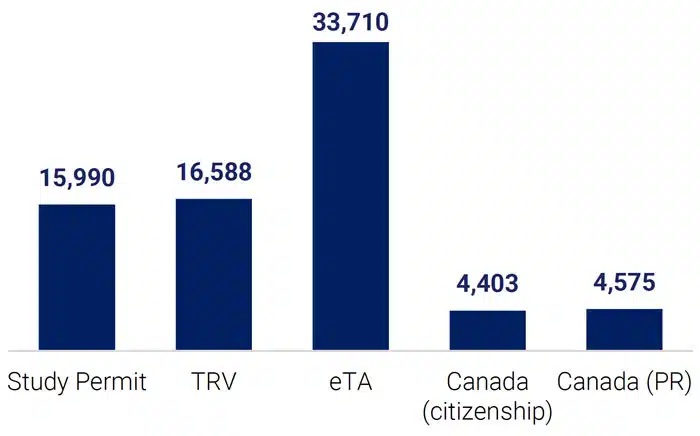
Student numbers by visa type, 2023. Source: BONARD/Languages Canada
The report adds that, “In 2023, the fastest-growing visa category was the Temporary Resident Visa (TRV). The number of students entering Canada through the TRV route increased from 8,559 in 2022 to 16,588 in 2023, surpassing pre-pandemic levels. This also caused a drop in the average course duration seen predominantly in the private sector. On the other hand, the number of students on study permits decreased from 17,191 in 2022 to 15,990 in 2023 due to issues with visa processing and refusals.”
As we have seen in other destinations this year, however, Canadian language schools report that visa issues prevented thousands more students from pursuing their studies in 2023. The report estimates that at least 2,671 students were not able to travel to Canada as planned due to processing delays for temporary resident visas, and that a further 4,479 students were not able to travel due to study permit delays.
This means that visa processing issues disrupted the travel plans for a minimum of 7,150 language students in 2023 – a number equivalent to 7% of the total enrolment for the year. Commenting in a foreword to the report, Languages Canada Executive Director Gonzalo Peralta said, “In 2019, Canada’s language programmes generated CDN$6.7 billion and 75,000 jobs, mostly derived from export revenues. In 2023, that figure decreased to CDN$5.5 billion and 62,000 jobs. This drop was not due to lack of opportunity, promotional efforts, or support from some areas of government, but was primarily due to immigration policy.”
Source: https://monitor.icef.com/2024/07/canadas-language-training-sector-reached-82-of-pre-pandemic-benchmark-in-2023/


